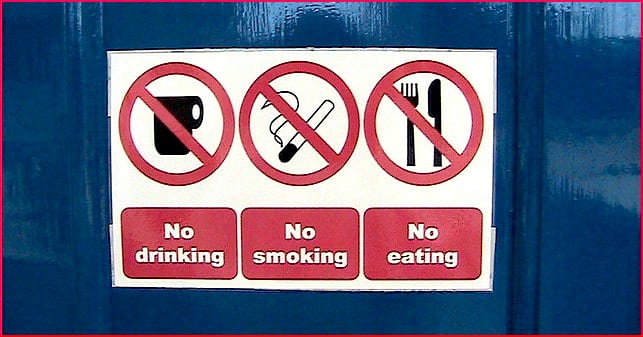
When we talk about correcting societal problems via governmental interventions, two different layers of argument need to be dealt with. First, is it justifiable under the Constitution, and the generally understood rules of human decency? In other words, should it be done? Some political philosophies hold that very little should be done by the government, and they have their reasons.
Then, there is the pragmatic side. Can it be done, and if it can, does it work? Sometimes the thing backfires. When a program is mandated in public schools for almost 20 years, and affects millions of kids, and then turns out to be worse than nothing, attention must be paid. It is the sort of outcome that we can’t afford too many of.
Troublesome trio
Childhood Obesity News has looked at several ways in which smoking resembles compulsive overeating. Cigarettes are clearly addictive, and that perverse attachment becomes the main reason to continue smoking, according to the authors of a paper on glamorization and stigmatization.
They also maintain that easy availability reinforces the behavior, along with positive mental and emotional associations. Those motivating factors are tangled up with a belief that to quit smoking is extremely difficult.
Various foods seem to have distinct addictive qualities, or maybe the addiction should be qualified as behavioral, but either way, it turns out that an inability to adopt a reasonable eating pattern looks exactly like addiction, and certainly many patients describe it that way.
Alcohol can also be wildly addictive, and its consumption is another activity that society tries to repress in different places, at random times, and with varying degrees of success. Easy availability is quite frequently a factor in overuse. In any part of the globe it is usually possible to procure alcohol, or cigarettes, or too much of the wrong kinds of food. Very often, people are lucky enough to have access to any two of them, or even all three.
Dangerous bonding
We learn from advertisements that people smoke while enjoying pleasant or exciting life experiences. Having been hypnotized into believing that a good time is deficient without nicotine, when a positive moment takes place, the person lights a cigarette to make the experience complete. That smoking episode melds with the boat ride or the amusement park excursion to form a happy memory, and the next cigarette brings back the happy memory, and so on, ad infinitum.
In endless combinations, liquor and fun go together, until one day they don’t anymore. More than the other two, food is notorious for being purposefully associated with all kinds of good times, from childhood birthday celebrations to religious feast days to the pie-eating contest at the county fair. At emotionally fraught family gatherings, overeating is the whole point. In the realm of positive mental and emotional associations, all three bad habits are capable of forming self-reinforcing loops.
Similar, but not the same
But the vices have their differences. The authors of the paper say,
For instance, it appears that there is no evidence of a safe level of consuming tobacco cigarettes or other types of tobacco products, and this applies equally for intermittent, occasional or light use. This differentiates tobacco from alcohol, for which there is a serious scientific debate about its moderate use, which would not be associated with bad health effects.
Of course, for an alcoholic there is no safe level of alcohol. With food, there definitely is a safe level, and a necessary level. A person can live without smoking or drinking, but not without eating. This is no excuse for the vast amount of overeating that goes on, and perhaps indicates that interventions successful against smoking or drinking are futile when faced with compulsive overeating.
Your responses and feedback are welcome!
Source: “Tobacco smoking: From ‘glamour’ to ‘stigma’. A comprehensive review,” Wiley.com, 10/09/15
Photo credit: Vivien Rolfe/Biology Open Educational Resources on Visualhunt/CC BY-SA

 FAQs and Media Requests:
FAQs and Media Requests: 











